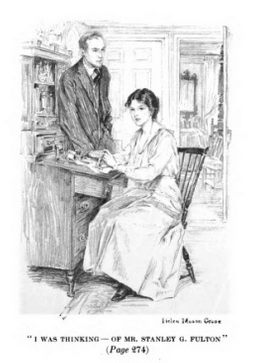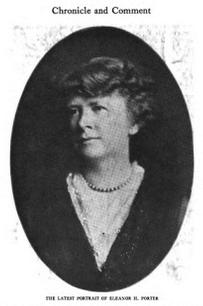The reviews on my book list have gotten longer, and my posts have gotten fewer and farther between, so I’ve decided to post my write-ups individually as well as on the book list. Here’s the first one, of Eleanor H. Porter’s 1918 novel Oh, Money! Money!.
Sometimes, like when you’re on a really long plane flight, as I was recently, all you want is a well-told story. And Porter, most famous as the author of Pollyanna, knows how to tell one. Stanley Fulton is a fabulously successful businessman (it’s never clear exactly how he made his millions) whose wealth and fame haven’t brought happiness, love, or health. In his early fifties, it dawns on him that he has no one to leave his fortune to, his closest relatives being three distant cousins in the New England town of Hillerton whom he’s never met.
Fulton fakes an expedition to South America, “disappears,” shows up in Hillerton under an assumed name, leaves a provisional bequest of $100,000 to each cousin, and watches what they do with the money. The one who spends it most wisely will inherit his millions. Along with the three cousins–the one with the extravagant wife, the one with the pathologically cheap wife, and the ditzy spinster (all flaws in this novel are doled out to the women), there’s their stepsister Maggie, who turns out to be the most sensible one of the lot. The story is slow in unfolding at the beginning–just give them the money already, Stanley!–but it’s fun to watch what unexpected wealth does to these ordinary people.
(I read this free Kindle version of the book, which was of reasonably high quality–I only noticed a few typos. I also bought this paperback version before I learned my lesson about the quality of out-of-copyright print-on-demand books. As with many such books, it has teeny-tiny print. A word to the wise: if you’re considering buying a print-on-demand book from Amazon, click on the one-star reviews, which often give you a heads-up about this type of problem.)



The novel’s plot reminds me of the concept of the 50s TV show “The Millionaire” where the gift of a large sum of money is the gimmick to show its effect on character, but with the King Lear family angle added.
LikeLiked by 1 person
I’d heard of The Millionaire but wasn’t familiar with the show, so I read up on it on Wikipedia. It does seem to be similar in concept. It’s an eternally fascinating subject, I guess–what would we do with unexpected wealth, and how would it change us?
LikeLike
I loved your book review. It lets us “pre-select” books that we would be compatible with. Theodore Dreiser wrote SISTER CARRIE in 1900. Frank Norris was also money-mad in McTeague (1899). Remember the TV show “Queen for a Day?” My sister and I loved shedding tears for the mother who couldn’t afford bunk beds for her young boys. I don’t remember any follow-ups in which we could see how her character changed with the arrival of money. Then there was the treacly “This is Your Life,” in which figures from one’s past come parading across the stage, introduced by the empathetic Ralph Edwards — the influential teacher, the life-saving childhood friend, the poor cousins who could never have afforded a reunion trip. These were all fiftyish story lines. Did World War II make us so grateful for our prosperity?
Oh, speaking of tiny print, I ordered a “classic” copy of Edna Ferber stories, printed in what must be 8-point type. I’m thinking of buying one of those book-size magnifying sheets. Even my drugstore reading glasses aren’t cutting it. So it’s sitting on an end-table waiting for me to make a decision. It’s getting bumped again, now that Bob Woodward’s FEAR arrived this afternoon. Not my usual reading fare — I’m obsessed with novel-writing — but reading about political realities would be refreshing. And somehow necessary.
This reply is horribly disorganized, for which I apologize. But I love your new approach to literary criticism. Looking forward to more!
LikeLike
Interesting how someone getting a small boost up from poverty used to inspire millions–I doubt anyone would bother to watch a show like that anymore. When you mentioned you were planning to read Edna Ferber’s stories, I wanted to warn you about the tiny print issue, but it was too late, you’d already ordered the book. The easiest print-to-order books to read are from the Forgotten Books publisher. They’re scanned from library copies, so they often have marks in them, but at least they’re readable.
LikeLike
Ooh, thanks for the Forgotten Books recommendation. I’ll look it up as I order more Edna Ferber. I love love love her stories! I’m putting FEAR on hold until I get a few more Ferbers under my belt. I love unglamorous urban settings and the people who struggle in them! I think the intro tells us that Edna is valued in the literary world as a recorder of working-class lives. (What about Studs Lonergin and a few others whose names escape me at the moment?) The sociological details are wonderful. Unhappy young women in the city… reminds me of Jean Rhys, though that’s a stretch. The writing is funny and smart, esp. when she meets the Kid Next Door in the boarding house on her first night: “She wiped off the cold cream and salt tears with a dry towel, did her hair in a schoolgirl braid and tied it with a big bow and dressed herself in a black skirt and a baby blue dressing sacque.” A sacque sounds like something her counterpart in Paris would wear. As for the Kid Next Door, who was waiting outside in the hall, “his grey sweater covered a multitude of sartorial deficiencies.” And this is just the first story I’ve read!
I think Buttered Side Down will help me get through the FBI investigation next week. Something has to! Nathan said that our sentences should TASTE good. This passes that test in spades.
BTW, I’ve hit a slowdown on the next few chapters of my novel. I need to sharpen the dialogue, says my workshop professor, and make the “arc” clearer. But the rest of it (Chaps. 16 to 25), looks good, I think. Who knows?!
Have a nice weekend. You’re on your last trimester!
LikeLike
I’m so glad you’re enjoying Edna Ferber! “Unglamorous urban settings and people who struggle in them” sums up these wonderful stories so well. This is the kind of thing they should make MFA students read. Speaking of which, my recollection is that it was someone (fondly) satirizing Nathan who made the comment about sentences tasting good. Good luck with your revisions!
LikeLike
I enjoyed reading this review. It makes me want to read the book. Several years ago, I was trying to read books written exactly one hundred years ago. But I haven’t ready any 1918 books ywr this year- maybe now is the time to start.
LikeLiked by 1 person
Great to hear from you, Sheryl–your blog has been a big inspiration for my project, and I mentioned it in my halfway-through-1918 post. I think “Oh, Money! Money!” would be a good choice for a 1918 read. Actually, I see that I’ve only read two books so far that were actually published in that year. The other was “Married Love,” which was fascinating from a sociological perspective but not exactly recreational reading–plus, it was banned in the United States.
LikeLike